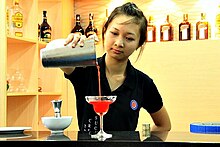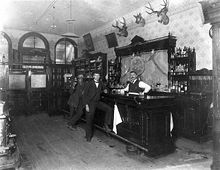barkeeper




A bartender ( English bartender or barkeeper ) works in a bar behind the counter . He mostly pours alcoholic beverages to the guests. He also mixes cocktails in cocktail bars . Other common names are barman (engl. Barman ) or female counterparts bartender or Bardame (engl. Barmaid ). Cocktail bartenders are also called bartenders .
Terms and demarcation
In German, bartender is the most common term and synonymous with the English word bartender . In the English-speaking world describes bartender activity at the bar in general (Engl. To tend a bar ) while bartender also has a second meaning that the bar owner , so the innkeeper called and restaurateurs who owns the bar.
Many professional bartenders like to refer to themselves as bartenders (such as Charles Schumann ), women occasionally as barmaids . Since the 2000s, the term bartender has also been used increasingly in the German-speaking world (as in the German-language specialist magazine Mixology ). The word barmaid does occur in German, but in common usage it used to be understood more in the sense of animation lady and not in the sense of bartender , barmaid or bartender .
Outside of bars, the service specialist (formerly waiter ) who takes care of the serving of drinks is also known as a buffet waiter , buffet or counter .
The work of bartenders is now increasingly referred to as bartending in German-speaking countries .
Education and professions
Barkeeper, bartender, barman (s) and barmaid are not protected job titles and only describe the activity carried out at the bar. Efforts to create a state-recognized training occupation with two or three-year dual vocational training in accordance with the Vocational Training Act have so far been unsuccessful. The job description of the bartender is therefore not clearly defined. Many bartenders - especially in the upscale restaurants and hotels - have professional training and many years of professional experience, whereas many other companies only work with semi-skilled part-time workers.
Frequently trained restaurant or hotel specialists go to the bar after their vocational training in a so-called further training year. Afterwards they can attend a private bar school, which prepares for the further training examination to become a certified bartender IHK before a Chamber of Industry and Commerce (IHK) . Without previous professional training, only those who - depending on the Chamber of Commerce and Industry - can prove a three to four year relevant professional activity as a bartender will be admitted to this examination. The highest advancement training is the certified bar master IHK and requires at least another year of relevant professional experience. The courses to become a bar master prepare for the independent management of a bar or the position of an employed chef de bar and also convey the necessary commercial knowledge.
In the hotel industry , different terms have emerged for the bartender's spheres of activity of different sizes: Commis de Bar (such as "counter help") are mostly young bartenders in their first year of assistant, with increasing experience and responsibility one becomes a Demi Chef de Bar (representative of the Chef de Bar ) or Chef de Bar (such as the "senior bartender"), who is responsible for the entire bar area, including purchasing , costing and personnel deployment. All are employees . In pure bar operations in the catering trade, the English terms bartender, bartender, barmaid etc. are more common, the barman is also called bar manager. Other areas of work for bartenders are cruise ships, event catering (e.g. cocktail catering with mobile bars) as well as clubs and discos.
There are several professional associations for bartenders in German-speaking countries :
- The German Barkeeper Union (DBU) founded in 1953 . The forerunner was the International Barkeeper Union (IBU) from 1909 to 1936, which became part of the DBU after World War II.
- The Gilde der Deutschen Barkeepers / German Barkeepers Guild (GBG) founded as a DBU spin-off in 2019
- The Austrian Barkeeper Union (Ö.BU)
- The Swiss Barkeeper Union (SBU).
Ö.BU and SBU are members of the international umbrella organization International Bartenders Association (IBA); the GBG is aiming for membership.
German-language magazines aimed at bartenders, among others, are Drinks and Mixology .
The patron saint of the bartenders is St. Bernard of Clairvaux (Memorial Day August 20th).
literature
- Uwe Voigt: The great textbook of bar science. A handy guide for professional bartenders, bar masters, and bar managers. 3rd, revised edition, Matthaes Verlag, Stuttgart 2011, ISBN 978-3875150186 .
Web links
- Hamburg Chamber of Commerce : Bartender (accessed on August 14, 2011).
- Rostock Chamber of Commerce and Industry: IHK advanced training examination for certified bartender , IHK advanced training examination for certified bar master (accessed October 31, 2011).
- List of bar schools with which the Deutsche Barkeeper-Union eV works (accessed October 31, 2011).
Individual evidence
- ↑ a b Entry in Pons online dictionary , accessed on October 29, 2016
- ↑ a b Entry in Cambridge English Dictionary , accessed October 30, 2016
- ↑ a b Entry in Oxford Dictionaries , accessed October 30, 2016
- ^ Charles Schumann: Schumann's Bar. 1st edition. Collection Rolf Heyne, Munich 2011, ISBN 978-3-89910-416-5 , p. 276.
- ↑ About Mixology (accessed August 14, 2011).
- ↑ a b New Era? Gilde der Deutschen Barkeeper eV founded - fizzz. In: fizzz.de. Retrieved June 13, 2019 .